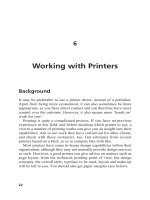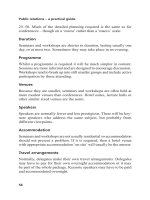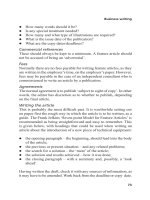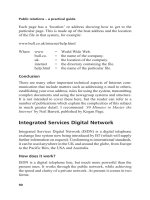The practical guide to organising events
Bạn đang xem bản rút gọn của tài liệu. Xem và tải ngay bản đầy đủ của tài liệu tại đây (1.22 MB, 228 trang )
The Practical Guide to Organising Events
The Practical Guide to Organising Events is a short, accessible and practical guide on
how to successfully plan and organise a variety of event types in a wide range of
contexts. The core sections of the text are logically structured around the key
stages of event management – pre-event, on-site and post-event – offering essential
practical insight and guidance throughout the whole process. Topics covered
include proposal writing, budget, funding and sponsorship, health and safety,
security and evaluation. This is a fundamental resource for all events management
students running and organising an event as part of their degree programme. It
is also a book for anybody who just happens to be tasked with organising an event
such as an office party, a social networking event, Christmas party or family
wedding. Based on experience, using real-life case studies and anecdotal examples,
The Practical Guide to Organising Events ultimately makes the business of events
management appealing, understandable and achievable.
Philip Berners graduated with a degree in hospitality management from the
University of West London where he later returned as a lecturer in events
management. He is presently teaching events management and researching for
his doctorate on the development of the events industry in a post-communist
society: a case study of Poland.
Philip spent ten years in Poland as an events consultant and founded an events
training school in Warsaw. He also taught event management for Collegium
Civitas University at the Palace of Culture and Science.
Philip has organised every genre of event in the UK, Italy, Portugal and Poland;
he was venue manager at the London Hippodrome, Camden Palace and Thorpe
Park; and he has been the in-house event manager for corporations including
the Daily Mail Group. His client portfolio includes the Queen, Prince Charles,
Bon Jovi, Shania Twain, Jennifer Lopez, The BRIT Awards, MOBO Awards, The
Publican newspaper, London Fashion Week, the British Red Cross, Xerox, Virgin
Atlantic, British Airways, Formula 1, Panasonic, Max Power magazine, PC Zone
magazine, Alternative Hair Show, Kent Institute of Art and Design, Schweppes
and Diageo.
Philip’s qualifications are as follows: Bachelor of Arts Degree in Hospitality
Management; City and Guilds in Hotel, Catering and Institutional Management;
Postgraduate Certificate in Academic Practice; Fellowship of the Higher Education
Academy; and he is about to commence his PhD.
The Practical Guide to
Organising Events
Philip Berners
First published 2017
by Routledge
2 Park Square, Milton Park, Abingdon, Oxon OX14 4RN
and by Routledge
711 Third Avenue, New York, NY 10017
Routledge is an imprint of the Taylor & Francis Group, an informa business
© 2017 Philip Berners
The right of Philip Berners to be identified as author of this work has been
asserted by him in accordance with sections 77 and 78 of the Copyright,
Designs and Patents Act 1988.
All rights reserved. No part of this book may be reprinted or reproduced or
utilised in any form or by any electronic, mechanical, or other means, now known
or hereafter invented, including photocopying and recording, or in any information
storage or retrieval system, without permission in writing from the publishers.
Trademark notice: Product or corporate names may be trademarks or registered
trademarks, and are used only for identification and explanation without intent
to infringe.
British Library Cataloguing in Publication Data
A catalogue record for this book is available from the British Library
Library of Congress Cataloging in Publication Data
A catalog record for this book has been requested
ISBN: 978-0-415-78998-1 (hbk)
ISBN: 978-0-415-78996-7 (pbk)
ISBN: 978-1-315-21363-7 (ebk)
Typeset in Iowan Old Style
by Florence Production Ltd, Stoodleigh, Devon, UK
I dedicate this book to two inspirational artists who entered my life:
Olaf Olenski
and
the late Whitney Houston
Contents
List of contributors
Preface
Acknowledgements
xi
xiii
xv
PART 1
Introduction
1 The culture of events
1
3
1.1
Developed markets
3
1.2
Undeveloped and developing markets
5
1.3
Sustainable events
7
2 The structure of events
8
2.1
Types of event
2.2
Sectors of the event industry
12
2.3
The structure of an event
14
3 The role of the event organiser
9
18
3.1
Types of event organiser
18
3.2
The ‘real’ event manager
19
3.3
The ‘real’ client
21
3.4
Risk and control
23
3.5
Staffing
25
VIII CONTENTS
PART 2
Management pre-event
4 The enquiry to confirmation stage
37
39
4.1
Enquiry
39
4.2
Brief
40
4.3
Proposal
43
4.4
Budget proposal
44
4.5
Confirmation
48
5 Management of the lead-in
49
5.1
Lead-in
49
5.2
The venue
52
5.3
Marketing
71
5.4
Funding
76
5.5
Theme
81
5.6
The client file
82
6 Catering and beverages
84
6.1
Catering
84
6.2
Beverages
92
7 Client liaison and communications
101
7.1
Tickets and invitations
101
7.2
Client liaison
104
7.3
Event checklist
105
7.4
Administration checklist
105
7.5
Production companies
105
PART 3
Management on-site: operational event management
8 Event organiser responsibilities
109
111
8.1
Checking
112
8.2
Hosting
113
8.3
The running order
114
8.4
Sequence
117
8.5
Production office
118
8.6
Rehearsal
120
CONTENTS IX
8.7
Caterers
121
8.8
Theme and decoration
122
8.9
Entertainment riders
122
8.10 Staff briefing
123
8.11 Pre-event briefing
124
8.12 On-site briefing
125
8.13 Security
125
8.14 Final walk-round
126
8.15 Fire, health and safety
129
8.16 Aesthetics
133
8.17 The front door
134
8.18 Cloakroom
135
9 Inside the event
138
9.1
The guest experience
138
9.2
The press
140
9.3
Event photography
143
9.4
De-rig
144
9.5
Get-out
145
Management post-event
147
10 Debriefs and reports
149
PART 4
10.1 Debriefs
150
10.2 Complaint handling
154
10.3 Guest feedback
156
10.4 Final report
158
11 Case studies
160
Case study 1 by Philip Berners: Garden party hosted by
Queen Elizabeth II, Windsor
160
Case study 2 by Philip Berners: Artist and VIP hospitality at
The BRIT Awards
162
Case study 3 by Philip Berners: Worldwide launch of the
Bon Jovi album, Crush
164
Case study 4 by Chantal Dickson: The 2014 Tour de France
Grand Départ, Leeds
167
Case study 5 by Paul Glover: A circus celebration event in London
169
X
CONTENTS
Case study 6 by Ariane Lengyel: Grand party at the Palace of
Versailles
170
Case study 7 by Amira Malek: Reflections on graduating with
an events management degree
171
Case study 8 by Dr Evangelia Marinakou: An international IT
conference in Greece
172
Case study 9 by David Titley: Reflections of studying for a degree
in events management
173
12 Event management as a career choice
177
13 The author’s career path
183
13.1 Author’s eventography
187
Appendices
189
I
189
Event enquiry form
II
Example sponsor packages
191
III
Event checklist
193
IV
Administration checklist
197
V
Example function sheet (running order)
198
VI
Final report
200
Glossary of technical terms
Index
202
207
Contributors
Chantal Dickson is a senior lecturer in Events Management at Leeds Beckett
University. Prior to joining LBU, Chantal worked in Australia primarily in the
business event management and community event management sectors.
Ashley Garlick is senior lecturer in Event Management at the University of West
London and was previously senior lecturer in Tourism and Events Management
at London Metropolitan University. He has an undergraduate degree in
International Hospitality Management and a Master’s degree in Management, and
has presented at academic conferences on the use of social media in learning
environments. He is working on a PhD to research the symbolic meaning applied
to strategy objects in organisations. Ashley’s professional background includes ten
years’ experience working in live music events and licensed retail. He is also
currently a volunteer manager with St John Ambulance, where he leads teams who
volunteer at some of the largest events in the UK.
Paul Glover is a business consultant and restaurant owner. Prior to this, Paul
was brand manager and account director for multinational advertising agencies.
He has worked for over 30 years on global brands in Europe and the United States
of America.
Ariane Lengyel was born in Paris, France. After graduating from Glion Institute
of Higher Education, Ariane started her career in the resort of Cannes, and was
then given the opportunity to go to the South Pacific island of Tahiti before moving
to Hua-Hin in Thailand. She worked in rooms division in hotels for over ten years
before moving to the UK and pursuing her career in head office sales and
marketing for Accor Hotels. In 2008 she made a change into hospitality education.
She holds a Master’s in Culinary Arts Management and is a Senior Fellow of the
Higher Education Academy. In 2016 she joined BPP University, London as
programme leader for Hospitality and Events, and continues her research interests
in the field of the sociology of food with a focus on celebrity chefs, presenting
papers at several conferences.
XII CONTRIBUTORS
Amira Malek graduated with a degree in Events Management from the University
of West London. After graduating, Amira secured a position with a creative
events company based in West London. She is involved with creating events
around the world – mainly within the video games and technology sector.
Dr. Evangelia Marinakou has extensive teaching experience at undergraduate
and postgraduate levels in various programmes in higher education following a
career in management in the Greek hospitality industry. She has worked as events
organiser and sales manager for tour operators in Greece, where she organised
large conferences and other significant events. She has served as head of
department and dean at various academic institutions in Greece, Switzerland,
Bahrain and the UK. Her research interests focus on women in hospitality
management and leadership, as well as teaching and learning methodologies in
higher education. On these research areas she has published a book, book chapters
and journal articles, and has presented at international conferences. She has also
worked on European Union-funded projects as project leader with a focus on
vocational training in hospitality and tourism. Moreover, she has trained a number
of professionals in the industry in lifelong learning programmes. She is a reviewer
in reputable academic journals and an accredited member of the Higher Education
Academy.
David Titley: upon graduating with a degree in Events Management, David
Titley was elected to the office of President of the University of West London
Student’s Union (UWLSU) by a majority 60% vote. Although his role is not eventbased, David oversees a large team who organise many student activities including
events for up to 500 guests. In his previous role at Twickenham Stadium, David
was responsible for the hospitality for the BMW sponsor’s lounge on major match
days and he managed the catering operations for international media during the
Rugby World Cup when his large team served 500 guests each day for a month.
Preface
My career path is unusual in its diversity because I did not remain in one sector
of the industry, such as running venues or organising business conferences. I have
moved around a lot and gained experience of every aspect of events management.
I have produced events, managed venues, been employed as the in-house head of
events for large corporations, was the director of an event agency, spent ten years
as an events consultant in Eastern Europe, and now I find myself lecturing future
generations of event organisers.
During my career, I have organised most types of events, including parties,
conferences, product launches, awards ceremonies, sports tournaments, weddings,
exhibitions, fashion shows, concerts and film premieres. My client portfolio ranges
from Xerox, Virgin Atlantic and British Airways to Her Majesty Queen Elizabeth
II, His Royal Highness the Prince of Wales, Bon Jovi, Jennifer Lopez and Shania
Twain. Somewhere along the way, I have been involved with The BRIT Awards,
MOBO Awards and London Fashion Week.
The diversity of my career in the events industry means I have learnt an enormous
amount about the art and practice of managing events.
Now, the most frequent question that is asked of me is how to reach the upper
echelons in this exciting industry. To this question, I answer that it takes
experience, not study.
This may seem odd, considering I teach events management. But, what a student
wishes to learn in the classroom is the way of doing events. Unfortunately, the
available textbooks tend to oversimplify the subject, or overcomplicate it. In truth,
events management – like most careers – is not so easy, nor so difficult. It fits
somewhere between. That is where The Practical Guide to Organising Events is
XIV
PREFACE
different: it is written between study and experience. It fits between doing the
job and studying the job. What I felt was needed was a practical guide to know
how to do the job of organising events.
Philip Berners, BA PG Cert FHEA
London, 2016
Acknowledgements
The following have earned my thanks:
Professor David Foskett MBE CMA and Professor Ryszard Zoltaniecki for their
inspiration going back many years.
Mr Ashley Garlick for contributing his knowledge to the sections on volunteers
and marketing.
Ms Chantal Dickson, Mr Paul Glover, Ms Ariane Lengyel and Dr Evangelia
Marinakou for contributing case studies, and Mr David Titley for contributing his
reflections.
Ms Emma Travis at Routledge for commissioning this book.
Mr (Frederick) Brian Cook and Ms Anita Cook.
PART 1
Introduction
Chapter
1
The culture
of events
1.1 Developed markets
In developed markets, events management has evolved as an industry in itself and
provides clients and corporations with services, facilities and management for
putting on an event.
For anybody who has an event to run, there are directories that provide listings
of event organisers, production companies, event services, caterers, venues, theme
companies, prop hire, and music and entertainment.
Competition is fierce in developed markets: venues are vying for business and
event organisers compete for clients. There is much overlap and anybody outside
the events industry could be confused by the difference between an event
management company, a production company or a public relations (PR) company.
1.1.1 Event management company
An event management company will provide its expertise for creative and themed
events, such as parties, product launches and celebrations. They organise most
elements for the running of an event, such as theme and decoration, creative
concepts, budget management, venue sourcing, and liaison with suppliers and
contractors. They take care of guest lists and will be there on the day of the event
to provide operational management.
4
INTRODUCTION
1.1.2 Production company
A production company specialises in events that require detailed technical
elements, such as business conferences (projection, visuals and presentation
speakers) and concerts (sound, light and special effects).
1.1.3 Public relations company or marketing company
These PR and marketing specialists provide the client with ideas and strategies
that fit the promotional goals and brand fit of the organisation. The PR or
marketing company would then employ the services of an event management
company or a production company to execute the event.
The key identifier here – in regard to a developed event industry – is the
employment of specialist companies to perform specialist tasks. The first mistake
(which is endemic in undeveloped and developing markets) is using the wrong
company for the wrong task – employing a marketing company to produce an
event, say.
Confusion about the events industry is further driven because a large and complex
event would necessitate the services of an event management company, a
production company and a public relations company working alongside each other
to achieve the goal of producing a successful event. The event management
company will control the logistics and perform operational management at the
event; the production company will take care of the technical requirements, such
as staging and projection; and the PR or marketing company will send out
invitations, draw up table plans, collate guest responses and manage the guest
lists on the door at the event.
Consequently, there is a lot of crossover in the events industry and lines do get
blurred as to who is responsible for which parts of an event (see Figure 1).
The events industry in developed markets can be likened to the medical profession.
An optometrist does the eyes and a dentist does the teeth. You do not want the
wrong one to do the other thing and you do not want one to do both!
Put simply, it is essential to recruit the correct specialist for the right job.
THE EVENT
Event organiser
Production company
PR company
Figure 1 Interaction of event organisers at one event
Venue event manager
THE CULTURE OF EVENTS 5
In many cases, larger charities and large corporations have a need to organise many
events. Rather than continuously outsourcing events management expertise, they
have found it necessary to establish their own in-house events department that
fits alongside the sales, marketing and PR functions, in which case the in-house
head of events takes the responsibility for managing an event instead of the
marketing manager.
It can be seen how events management in developed markets has become a
recognised and established career path, and universities offer specialised courses
to meet the demand.
1.2 Undeveloped and developing markets
In undeveloped and developing markets, the structure of the events industry is
noticeably flat. At best, events are a responsibility added to the duties of an already
overworked assistant in the marketing department. At worst, somebody can be
tasked with the difficult job of organising an event, simply because ‘they get on
with people and are good at that sort of thing’.
In undeveloped and developing markets, few, if any, specialised event companies
exist. Those that do exist have limited or no access to quality training and quality
experience in the art of managing events, so the way they organise events evolves
in a local fashion, which most often cannot achieve professionalism.
Furthermore, in undeveloped and developing markets event organisers are bereft
of international experience. This can lead to their belief that they are managing
events in the right manner, but without benchmarks to evidence this belief.
The lack of international experience is double-edged. On one side the event
organiser will not understand how to approach international standards, and on
the other side they may be contracted by a domestic client needing their services
to produce an event abroad.
The absence of international expertise also presents the question of how
undeveloped and developing markets can reach – even understand and appreciate
– international levels of events management. Thus, a second tier of events
management is created in these countries, which could be substandard in relation
to international expectations. This causes problems when international clients –
and guests – do not have their expectations met.
In most undeveloped and developing markets, the task of organising an event is
outsourced to PR and marketing companies that are not event specialists. This
drives an ‘I do it all’ culture where promises are made that may or may not be
fulfilled. But, never mind the consequences because the priority is to secure the
6
INTRODUCTION
client’s business, regardless. In this case, the factors of reputation and client
retention do not appear to matter.
Training in the specialism of organising events in undeveloped and developing
markets is limited to personal experience of the individual, which can be narrow,
half-hearted or even wrong. But, this is all they know.
In such markets a career in event management can follow a haphazard pathway
and will often occur by accident. This is where the study of events management
meets experience: experienced event organisers can teach how to organise events.
Interestingly, events are vital in both developed and developing markets – it
appears to be the career opportunities that differ. So, the professionalism and
creativity of events differ vastly also. There simply is not the ability to create
amazing events in undeveloped and developing markets and it is easier to follow
the norm. The attitude tends to be ‘this is the way we have always done it’.
But, all markets are increasingly global, not domestic, which means international
standards are necessary to achieve.
The trend for events is becoming national, international and global: take for
example the Euro 2012 football tournament hosted by Poland and Ukraine;
Azerbaijan hosting the Eurovision Song Contest; the Brazil Olympics; the Qatar
World Cup . . .
AUTHOR’S VOICE BOX
In a developing market, I know of a successful fashion designer who
organises every detail of his own catwalk shows.
At one event, the bar was placed in the wrong location at the venue – it
was not visible to guests, which was a wasted opportunity. But, also the
drinks sponsor lost the exposure of their products to the audience.
When I pointed out this logistical error to the talented designer at a
meeting a week or so after his show, he took personal offence because
he had decided where the bar should be positioned.
But, how could a fashion designer know the complexities and pitfalls of
organising events such as where a bar should be placed – and why should
he need to know?
This situation underlines the point that expertise in events is necessary.
After all, as an event organiser, I would not attempt to design a dress.
THE CULTURE OF EVENTS 7
International audiences have expectations of experience, quality, standards and
safety. Low standards equate to high risk, and this is no longer good enough for
the global audience.
1.3 Sustainable events
With the growth in the number of events happening in both developed and
developing markets, coupled with the growth in the size of actual events,
sustainability is a growing issue also.
Guests and visitors possess an increasing expectation when attending events that
are designed to provide them with an experience, that it is also a good experience
for the environment.
Where social events such as music festivals attract young and socially aware
visitors, there is demand for socially aware practices. It is becoming increasingly
unacceptable to offer a guest-experience at the cost of the environment.
So, the event organiser must meet guest demands and expectations – as always.
This requires sourcing innovative and forward-looking solutions for the legacy of
an event and the impact it leaves behind.
Where massive events now happen, the key sustainable areas to consider are waste
clearance; distance of travel necessary for both visitors to the event and the
suppliers so as to lessen carbon impact; land recovery; and power sources. The
latter should be solar and wind-generated where possible. Temporary toilet
facilities can be sawdust-based to absorb fluid waste instead of needing to
transport large quantities of raw waste to external processing sites.
The motivation to create an environmentally friendly event is led by guest demands
and expectations. But this alone is not enough. It is easy to employ marketing
tactics to pretend sustainability and the guests will never know the true ‘cost’ to
the planet.
Legislation is the true motivator, but the law on sustainable events is lacking.
Finally, then, the motivating factor to produce a sustainable event is that of
reducing costs. Financial incentives are helping to deliver sustainability and event
organisers are sourcing cheaper alternatives for the provision of power and the
disposal of waste, which is drawing the event industry towards sustainable
solutions.
Chapter
2
The structure
of events
What is an event?
An event is any live happening.
There it is: the definition of an event in just three words.
A hurricane is an event: a live happening defined as being a weather event. An
earthquake is a live happening: a natural event. A train crash is a live happening:
defined as being a catastrophic event.
Event management, therefore, is about managing a live event so that it does not
turn out to be a train wreck.
This book is about the management of live happenings.
If we could manage a hurricane, an earthquake or a train wreck, we would. We
would assess the risks of such an event – where it would happen; how many people
would be affected; what is the severity of the catastrophe about to happen – and
measures could be put in place to minimise injury and harm. We could move
people to shelters and emergency rescue teams could be deployed in the exact
area of the event before it occurs. Of course, we would require notice of the
event – early warning systems, such as for tsunamis, go some way to forecasting


![ipv6 for enterprise networks [electronic resource] the practical guide to deploying ipv6 in campus, wanbranch, data center, and virtualized environments](https://media.store123doc.com/images/document/14/y/nh/medium_nhs1401473712.jpg)






